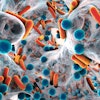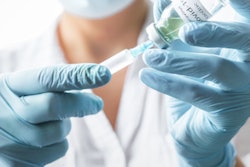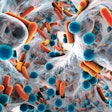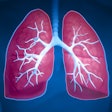
Gum made from a plant protein may be a real blow to SARS-CoV-2. Chewing the gum traps the virus, cutting the viral load in saliva, possibly curbing transmission, according to a study recently published in Molecular Therapy.
The authors of the study believe this is the first report of use of a biomaterial to debulk SARS-CoV-2 in saliva. Also, the approach may protect dentists and their teams from patients who are not wearing masks during dental treatment, the authors wrote.
Currently, the research team, led by the University of Pennsylvania School of Dental Medicine (Penn Dental Medicine), is working to obtain permission for a clinical trial to evaluate safety and efficacy when tested in people infected with SARS-CoV-2, according to a press release issued April 12 from Penn Dental Medicine.
"Chewing gum with virus-trapping proteins offers a general affordable strategy to protect patients from most oral virus re-infections through debulking or minimizing transmission to others," wrote the authors, led by Henry Daniell, PhD, of the department of basic and translational sciences at Penn Dental Medicine in Philadelphia (Mol Ther, November 10, 2021).
Prior to the pandemic, Daniell was studying the angiotensin-converting enzyme 2 (ACE2) protein for the possible treatment of hypertension. Daniell's lab used a patented plant-based production system to grow a protein that could be delivered when the plant material was freeze-dried and ground up. Also, Daniell was involved in research to develop a chewing gum filled with plant-grown enzymes aimed at disrupting dental plaque, according to the release.
His research came in handy during the pandemic. ACE2, a receptor for virus infection that is expressed in oral epithelial cells, binds to the SARS-CoV-2 spike protein. Daniell used his research to come up with a gum infused with plant-grown ACE2 proteins that had the potential to neutralize SARS-CoV-2 in the oral cavity, according to the release.
To test the gum, ACE2 was grown in plants and paired with another compound that enables the protein to block viral entry. When evaluated by quantitative polymerase chain reaction (qPCR) assays, the gum reduced SARS-CoV-2 virus count in COVID-19 saliva samples by greater than 95%, demonstrating both virus trapping and blocking of cellular entry. The saliva samples of COVID-19 patients who chewed the gum showed low or undetectable ACE2 activity compared to healthy individuals, the authors wrote.
Though this chewing gum used the full-length human ACE2 protein, future research should investigate engineered ACE proteins that have 170 times higher affinity to the SARS-CoV-2 spike protein to bind to emerging variants and effectively prevent infection and transmission, they wrote.
"Reducing the viral load using ACE2 chewing gum will not only help in mitigating the severity of COVID-19 variants but also limit the risk of transmission from a potential carrier," Daniell and colleagues concluded.




















